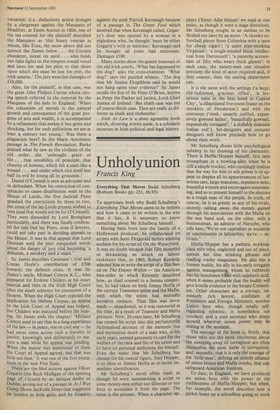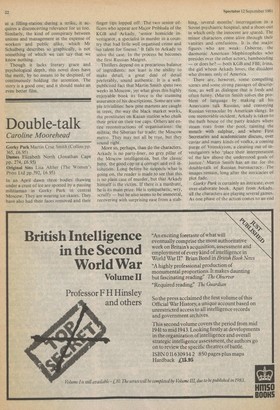Unholy union
Francis King
Everything That Moves Budd Schulberg (Robson Books pp. 251, £6.95) To appreciate both why Budd Schulberg's Everything That Moves came to be written and how it came to be written in the way that it has, it is necessary to know something about Mr Schulberg himself.
Having been born into the family of a Hollywood producer, he collaborated on scripts with Scott Fitzgerald before winning acclaim for his script of On the Waterfront. It was no doubt because that film mounted so devastating an attack on labour racketeers that, in 1960, Robert Kennedy selected him to write the script of a film based on The Enemy Within — the American best-seller in which Kennedy described how, as chief counsel to a Senate committee, he had taken on both Jimmy Hoffa of the corrupt Teamsters union and the Mafia, with which the union had mutually lucrative contacts. That film was never made — abandoned, so it was rumoured at the time, as a result of Teamster and Mafia pressure. Now, 20 years later, Mr Schulberg has turned his script into this perfunctorily fictionalised account of the meteoric rise and mysterious death of a man who, in his early years, seemed genuinely to care for the welfare of the rank and file of his union and to have no personal ambitions for himself. Even the name that Mr Schulberg has chosen for his central figure, Joey Hopper, is so close to Jimmy Hoffa as to invite immediate identification.
Mr Schulberg's novel often reads as though he were summarising a script to some money-men either too illiterate or too busy to assimilate it from the page. The tense is the present. When a character ap pears ('Enter Allie Hotzer' we read at one point, as though it were a stage direction), Mr Schulberg roughs in an outline to be fleshed out later by an actor. 'A chunky exfootball player from Columbia with a taste for cheap cigars'; 'a quiet pipe-smoking Virginian'; 'a tough-minded black intellectual from Dartmouth' ; 'a paunchy accountant of fifty who wears thick glasses': in each case, the money-men can visualise precisely the kind of actor required and, if they cannot, then the casting department can.
It is the same with the settings Ca large, old-fashioned, gracious office', 'a luxurious suite in the best hotel in Capital City', 'a dilapidated five-room frame on the outskirts of Henderson') and with the costumes ('sleek, smartly coiffed, expensively gowned ladies', 'beautifully gowned, expensively corsaged', a stylishly mannish Italian suit'). Set-designers and costume designers will know precisely how to go about their work.
Mr Schulberg shows little psychological subtlety in his drawing of his characters. There is Hoffa/Hopper himself, first seen triumphant in a bowling-alley when he is still a simple trucker, who cunningly realises that the way for him to win power is to appear to despise all its appurtenances of luxurious cars, large mansions, expensive suits, beautiful women and extravagant entertaining, and so to present himself to the electors as a rough man of the people. In truth, of course, he is as greedy as any of his rivals, secretly salting away the money gained through his associations with the Mafia on the one hand and, on the other, with a businessman, an admirer of Nietsche, who tells him: 'We're not capitalists or socialists or reactionaries or labourites, we're — activists.'
Hoffa/Hopper has a pathetic workingclass wife who, neglected and out of place, spends her time drinking gibsons and reading trashy magazines. He also has a former buddy, his ally in his early struggles against managementi, whom he ruthlessly has his henchmen blrad with sulphuric acid, when it seems probable that the buddy will give hostile evidence to the Senate Committee. Other characters are a corrupt, immensely rich lawyer, confidant of Presidents and Foreign Ministers; another Union boss who, though totally selfregarding sybaritic, is nonetheless not crooked; and a cool secretary who sleeps around wherever union power may be resting at the moment.
The message of the book is, firstly, that those who are the most vociferous about the sweeping away of corruption are often themselves the most liable to corruption; and, secondly, that it is only the courage of the 'little man', defying an unholy alliance of union bosses and Mafia crooks, that can safeguard American freedom.
To date, in England, we have produced no union boss with the power or the ruthlessness of Hoffa/Hopper; but when, for example, the novel describes how a picket beats up a schoolboy going to work at a filling-station during a strike, it acquires a disconcerting relevance for us too. Similarly, the kind of conspiracy between unions and management at the expense of workers and public alike, which Mr Schulberg describes so graphically, is not something of which we can say that we know nothing.
Though it lacks literary grace and psychological depth, this novel does have the merit, by no means to be despised, of continuously holding the attention. The story is a good one; and it should make an even better film.

































 Previous page
Previous page